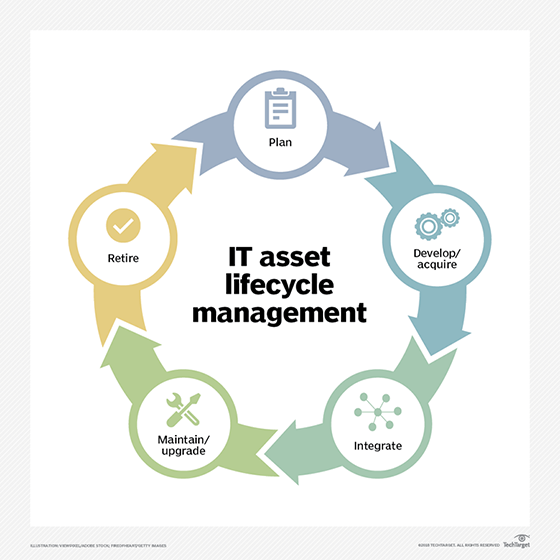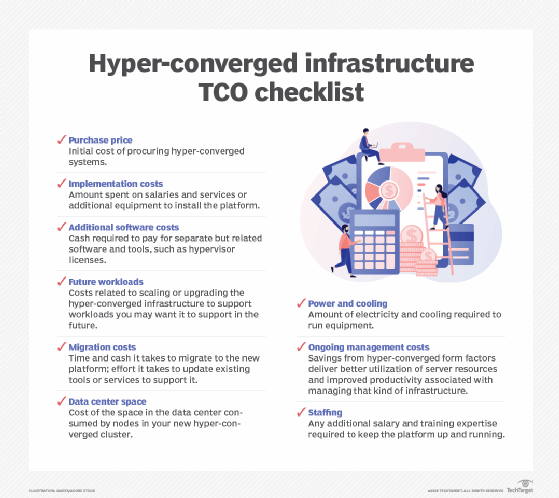What is total cost of ownership (TCO)?
Total cost of ownership (TCO) is an estimation of the expenses associated with purchasing, deploying, managing, using and retiring IT assets, such as a product or piece of equipment.
TCO, or actual cost, quantifies the cost of the purchase across the product's entire lifecycle. Therefore, it offers a more accurate basis for determining the value -- cost vs. return on investment (ROI) -- of an investment than the purchase price alone.
TCO can be calculated as the initial purchase price plus costs of operation across the asset's lifespan. It is especially critical in IT, manufacturing, supply chain management and cloud computing, where operational costs often exceed initial purchase costs.

What factors determine TCO?
Overall TCO includes direct and indirect expenses, as well as some intangible ones that may be assigned a monetary value. TCO includes the following:
- Direct costs, e.g., purchase price, installation, maintenance.
- Indirect costs, e.g., training, downtime, performance inefficiencies.
- Intangible costs, e.g., employee productivity loss, compliance risks.
For example, a server's TCO might include an expensive purchase price. However, indirect costs could include a good deal on ongoing IT support and also factor in low systems management time because of its user-friendly interface.
TCO factors in the costs accumulated from purchase to decommissioning of the asset.
For a data center server, for example, this means initial acquisition price, repairs, maintenance costs, upgrades, service or support contracts, network integration, security, software licenses and employee training.
It can even account for the credit terms on which the company purchased the product. Through analysis, the purchasing manager might assign a monetary value to intangible costs, such as systems management time, electricity used, downtime, insurance and other overhead.
Total cost of ownership must be compared to total benefits of ownership to determine the viability of a purchase.

New TCO considerations today
In addition to the aforementioned criteria, total cost of ownership today also may include the following:
- Cloud computing and software-as-a service (SaaS) costs
- SaaS subscription models introduce unpredictable long-term costs.
- Hidden fees for data storage, application programming interface calls and vendor lock-in affect TCO.
- Cloud egress fees -- costs to move data out of a cloud provider -- are often overlooked.
- Artificial intelligence (AI)-powered cost optimization
- AI can help to predict maintenance costs and optimize IT infrastructure spending.
- Predictive analytics helps forecast vendor pricing changes.
- Sustainability and green IT
- Energy-efficient servers, cloud data centers and carbon footprint reductions affect TCO.
- Regulatory requirements for sustainability reporting add compliance costs.
The challenges in calculating TCO
There are several methodologies and software tools to calculate total cost of ownership, but the process is not perfect. Many enterprises fail to define a singular methodology. This is an issue because they cannot base purchasing decisions on uniform information.
Another problem is that it is difficult to determine the scope of operating costs for any single piece of IT equipment. Some hidden cost factors are easily overlooked, such as depreciation and warranty, or inaccurately compared from one product to another.
For example, support costs on one server may include the cost of spare parts. This might make support cost more than it does on another server but eliminate the acquisition cost of buying a new system.
Cost of ownership analysis generally doesn't anticipate unpredictable rising costs over time -- for example, if upgrade part costs jump substantially more than expected due to a distributor change.
TCO calculations cannot account for the availability of upgrades and services or the impact of vendor relationships.
If a software vendor cancels a particular functionality after three years, no longer stocks parts after five years or ends support for certain software, the enterprise may be subject to unexpected and significant additional costs, which could drive TCO far beyond its initial estimate.

TCO in cloud vs. on-premises IT infrastructure
Given the information covered in the previous section, the following serves as a breakdown of TCO factors in a cloud versus on-premises infrastructure.
| Factor | Cloud (SaaS, IaaS, PaaS) | On-premises (servers, data centers) |
| Upfront cost | Low (subscription-based) | High (Capex investment) |
| Maintenance cost | Managed by provider | In-house IT team |
| Scalability | High (elastic) | Limited |
| Energy cost | Included in fees | Paid separately |
| Vendor lock-in risk | High | Low |
| Long-term TCO | Variable | Predictable |
Best practices to optimize TCO calculations
Enterprise managers and purchasing decision-makers complete cost analyses for multiple options and then compare TCO to determine overall costs and, ultimately, the lowest long-term cost. The following best practices can help organizations optimize TCO:
- Use AI and predictive analytics
- AI-powered tools can analyze historical spending patterns and forecast future costs.
- AI-driven cloud cost management platforms -- e.g., Apptio, Cloudability -- help optimize cloud TCO.
- Factor in environmental, sustainability and governance costs
- Track carbon emissions from IT infrastructure.
- Invest in energy-efficient hardware to lower long-term operational costs.
- Consider the true cost of vendor lock-in
- Assess long-term migration costs before committing to a vendor.
- Understand how proprietary solutions limit future flexibility.
- Use a standardized TCO framework
- Gartner's TCO model is used for IT infrastructure and cloud migration.
- ISO 15686-5 is used for building lifecycle cost analysis.
Not sure what it will cost to run workloads in the cloud? Discover the key variables to calculate cloud total cost of ownership when comparing on-premises deployment with cloud deployment to avoid costly surprises later on.






